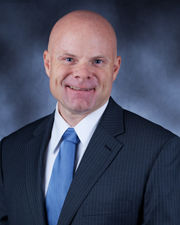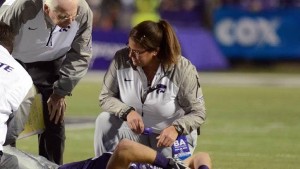
Article reposted from The Topeka Capitol Journal cjonline.com
Author: Delaney Hiegert
When the Olympic torch reaches its destination in August and viewers around the world tune in to watch the opening ceremonies of the 2016 Rio de Janeiro Olympic Games, Phillip Vardiman will be gearing up behind the scenes.
Vardiman, director of Kansas State University’s athletic training program, is among six athletic trainers who will work with the U.S. track and field team at the Olympics.
He began working with USA track and field in 2008 at the World Cup Race Walk Championships in Russia. Since then, he has traveled the world volunteering his time to world-class athletes as they compete in such countries as El Salvador, Scotland, Mexico and the United Kingdom. Though he has been involved with multiple international competitions, the Olympic Games will be bigger by far.
“It’s kind of special,” Vardiman said. “The first big meet I got selected to go on was the 2011 Pan Am Games, and that was an amazing experience. So this is really neat.”
Vardiman has nearly two decades of certified athletic training under his belt. Aside from his role as director, he also is an associate professor at K-State, and he previously worked at Oklahoma State University, the University of Arkansas and the University of Kansas.
Vardiman, who received a master’s degree from Oklahoma State and a doctorate from the University of Arkansas, said he takes pride in the opportunity to assist the athletes.
“It’s a great way to kind of serve your country, so to speak,” he said.
Vardiman’s work with the U.S. Olympic Committee is voluntary, and he won’t be paid. However, the USOC and USA Track and Field will cover travel, gear and living expenses while he is in Brazil.
Training athletes
Vardiman began working with USA track and field with help from Jack Ransone, director of the Nebraska Athletic Performance Laboratory.
“He asked me if I would be interested in helping him by going to Russia for a track and field trip, if I was interested in getting started with USA track,” Vardiman said. “And I thought he was joking with me.”
Eight years later, it is evident it was no joke as Vardiman prepares to treat athletes competing in one of the largest and most-watched sporting arenas.
“I actually have started to do more manual therapy on friends, athletes who have asked for various soft tissue works — just to kind of train for the Olympics, because I’ve been working on office stuff, teaching materials, things like that, for my normal job,” he said. “So going from not doing a lot of it to working anywhere from 12 to 15 hours a day and doing a lot of work, it gets to be very physically taxing. So it’s almost like we’ve got to train just a little bit.”
Vardiman will travel with a medical team including five other athletic trainers, two physicians, two chiropractors, two sports psychologists and three massage therapists who will treat between 120 and 130 athletes.
Most of the staff has worked with athletes at the international level for years, Vardiman said.
“I’m really one of the newest and youngest on the staff. A lot of the other athletic trainers have been doing this for a couple more years than I have,” he said. “It’s pretty neat. And the skill level that these other individuals bring to the table, it’s amazing. I’m humbled to just be in the same category as a lot of these other skilled providers, honestly.”
Gaining perspective
Vardiman, who completed five years of clinical work experience, training sessions, multiple applications and paperwork approvals to begin working with USA track, said the opportunity to continue working with the athletes comes down to cooperation and effective work. During each trip, he explained, volunteers are evaluated by athletes and staff.
“If you’re skilled enough and you get along with everybody and you work well as a team, you can continue to move up the ladder,” he said.
Vardiman said he is grateful for the support of his family, friends and colleagues at home. He is a father of two and said it would be impossible for him to travel and work with the athletes without his wife’s support.
His colleagues, too, have encouraged him. They cover classes while he is away, he said, and administrators also have been willing to allow his travels.
Vardiman expects to learn from his Olympic experience and believes it will benefit his students, too.
“It gives you a perspective on the world that you can kind of add and bring back to the classroom,” he said. “There’s a lot of carryover from what I’m learning by going on these trips to how we’re going to insert that into the curriculum here.
“I also kind of want to be a role model to the kids, the students, to encourage them to be interested in volunteering for the USOC. It’s unique, and it really depends greatly on volunteerism.”
‘In the rear with the gear’
For Vardiman, sightseeing isn’t the best part of his trips.
“The interactions with the athletes are always the best,” he said. “The interactions with the staff, the amount of information that we share with one another and learn from one another, the amount of camaraderie — you’re on your own team when you’re there.”
The Rio Olympics likely won’t be Vardiman’s last excursion with the track team. He plans to continue his role in the program and the U.S. Olympic Committee.
When the first gun fires for the 2016 Olympic track and field events, Vardiman said, he will experience the best part of what he does.
“Just to be a part of that, to know that you’ve cared for them through training camp and through the pre-sessions prior to the final race and to see them actually go out and use their God-given talent — that’s just awesome,” he said.
“It’s a general rule: Athletic trainers are in the rear with the gear. That’s where we like to be, honestly. We’re in a supportive role, and it’s all about the athletes. And that’s how we like it, because seeing someone perform at their optimal level is the best, it really is. And to be a part of it is very special.”
Vardiman will leave July 23 for processing and the athletes’ training camp in Houston before leaving Aug. 3 for Brazil. The Olympic Games run from Aug. 5-23.


